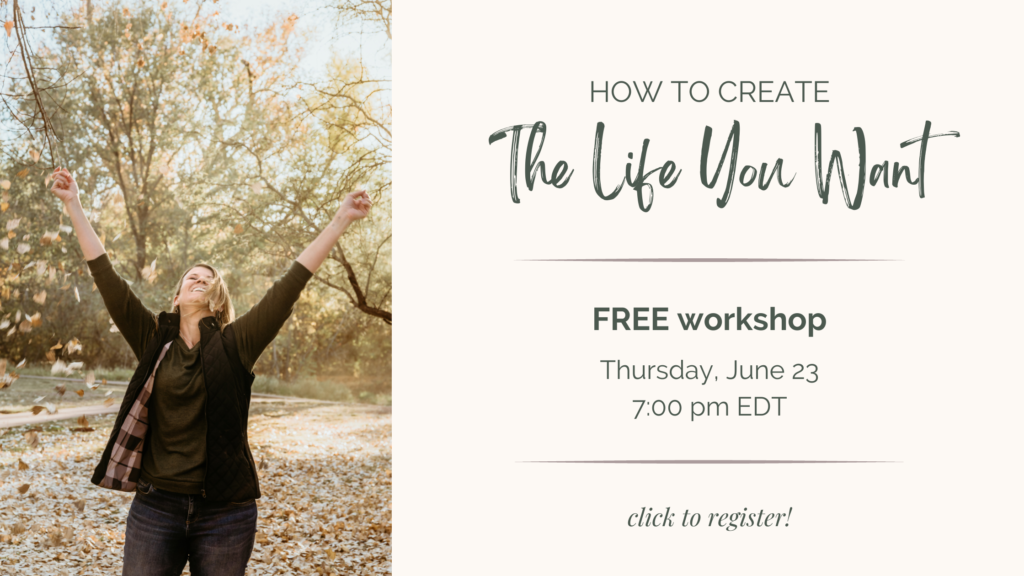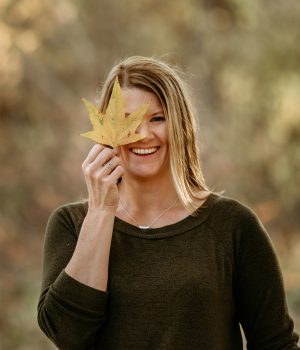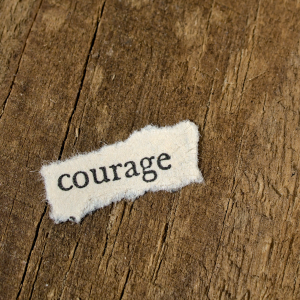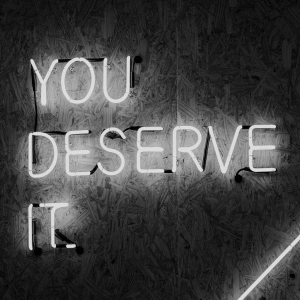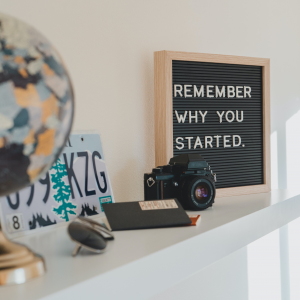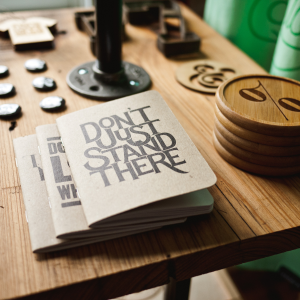Episode 90: In this episode of the podcast, I’m covering the first step in my 5-step signature process for rebuilding during a life transition. You’ll learn how to get your bearings by assessing specifically what it is in your life that’s causing you stress, overwhelm, unhappiness, or other negative feelings. You’ll also learn how to give yourself permission to dream and create a vision for the life you want, as well as discover one of the major things that are keeping you stuck.
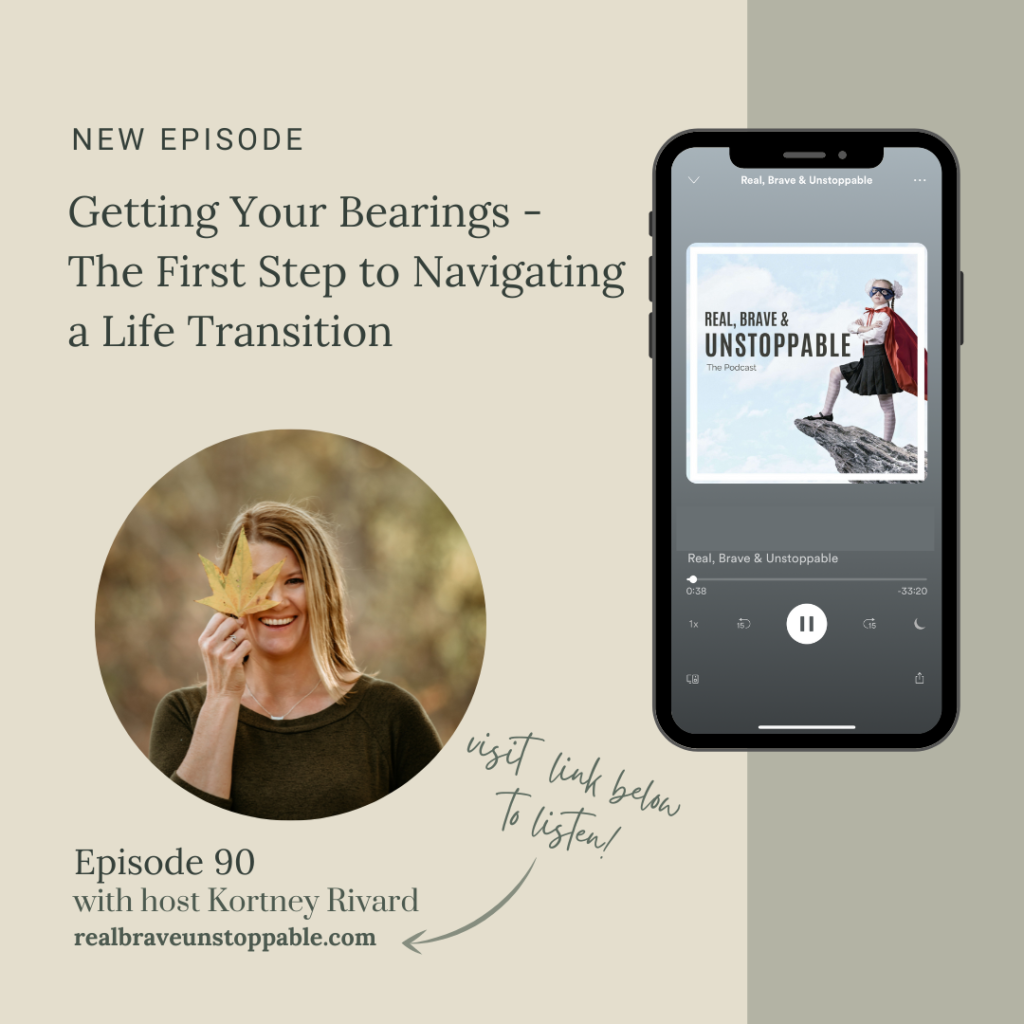



Prefer to read an article? Visit Kortneyrivard.com/blog
Show Notes:
In this episode, I’m talking about how to get your bearings and re-orient yourself during a big life transition like a divorce or breakup.
You’ll learn:
- the method I use to get out of overwhelm and feel empowered to take back control of my life
- how to give yourself permission to dream and create a vision for the bigger and better life that you deserve
- what’s standing in your way 9 times out of 10 and is keeping you stuck
- how to trust your next right steps and take massive action one baby step at a time.
I’m also sharing a value-packed free workshop called How to Create the Life You Want. You can learn more and register HERE.
Resources
The most important relationship is the one you have with yourself. But why is it so hard? Schedule a Strategy Session to discover how you can start.

Schedule a call at www.kortneyrivard.com/lets-talk
Visit https://kortneyrivard.com/lovelife to download a free guide on how to create a life you love!
Support the show (https://www.buymeacoffee.com/kortneyrivard)
Other episodes:
- Ep 122: How to Take the High Road When People Say Mean Things About You
- Ep 121: 5 Ways to Make the Mirror Your Friend
- Ep 120: Getting Back on the Goals Bandwagon – Setting Better Goals
- Ep 119: Slow Down! How to Embrace Getting Still and Waiting Patiently
- How to Fix Your All-or-Nothing Thinking
The Real, Brave, & Unstoppable full episode catalog
Transcript:
Episode 90
[00:00:00] Well, hello friends, and welcome back to the podcast. This is episode number 90. It’s funny last week, I think when I was editing episode number 89, my daughter was looking over my shoulder and said, oh mom, you’re only 10 episodes away from number 100.
[00:00:18] I thought that was funny. She’s kind of into counting down stuff right now. Because school’s almost out. She’s made a countdown chart. She has it on her wall in her room. So I think we’re down to nine days left of school. And then we’ve got to come up with a summer routine. It’s always fun. Isn’t it? Parents, you know what I’m talking about?
[00:00:38] So today on the podcast, I’m going to talk about
[00:00:43] getting your bearings.
[00:00:44] After something, you know, gets upset in your life. And I know on this season I’ve been talking a lot about life transitions, like divorce, and the end of relationships and jobs, ending careers, ending things like that. But really this applies to any time you’ve had some kind of setback-
[00:01:05] Even if it’s not like a giant life smack in the face. But lately you’ve probably noticed I’ve been talking a lot about the five phases or five stages that I feel like everyone goes through when they’re experiencing some kind of life transition like a divorce or a breakup, career change, kids going off to college,
[00:01:27] Et cetera, et cetera. It’s kind of like you’re getting lost in the wilderness or the woods, and you’re just trying to find your way again.
[00:01:35] So today I’m going to talk about the first phase, which is getting your bearings. It’s really like you have a trail map that you’re not sure like where exactly on that map you are. So it’s just getting your bearings and kind of figuring that out. And actuallym I’ll recap all five of those phases quickly before we dive into the first one
[00:01:55] so you can get a little context. But to recap them, the first one is when you just feel something in your life happens and you feel like completely disoriented from the changes that have taken place. You’re knocked out of your routine. Your emotions might be really hard to deal with.
[00:02:13] You might even find yourself in some kind of victim-y energy. And this is the phase where you really need to get a grip on your situation, reorient get your bearings and find where you’re at on your map. You might not really know exactly where you’re going yet, but that’s okay because you’re going to start to find that out too.
[00:02:32] And that’s something that can always evolve too. But first you got to know where you’re at. The second phase is just surrendering to your situation, letting go of the idea that the path that you were on was the right one and accepting that there might be one that’s better for you right now. The third one is self-discovery. It’s coming home to your heart.
[00:02:52] Finding your inner compass. And also trusting that to guide you. And the thing is that your heart or your inner compass is always going to guide you no matter what as long as you learn to listen to it and to trust that it has the ultimate wisdom for you. The fourth phase is self-love and this is the navigation part. It’s using your compass as well as learning to enjoy the scenery, enjoy the journey that you’re on. And that means loving yourself unconditionally, all the parts, not just the parts that are easy to love.
[00:03:26] And then the fifth phase or stage is your “summit bid”. This is where you take all that growth and you gather up all of your courage to get where you want to be. And this is the part where I always say like, you’re going for it. You’re unstoppable.
[00:03:40] And it’s important to note that these are based on my own experience. They’re not researched or anything like that. And also it’s not a linear process. We kind of go back and forth through these phases as we grow and continue on our journey. You know, we might be working on self-love, but then something else happens in our life and we have to kind of go back and
[00:04:02] reorient again, go back to phase one or, you know, we’re always learning how to surrender to what is, so we pop back into phase two a lot. So it’s not a linear process. They’re just different places that we kind of visit as we grow on our journey.
[00:04:18] And it’s also important to note that our lives are filled with multiple summits. So, you know, you reach one and you’re not done. It’s not like we just sit down and wait for the rest of our life to pass. Because that’s just not who we are as humans. But today, I want to talk about the first stage. And as I said, this stage is where you might feel disoriented.
[00:04:41] I work with mostly people who have gone through something where they feel a little lost and they don’t really know who they are anymore. They’re not really sure. Or maybe what they even really want. And certainly they don’t know how to get there. And that’s a frustrating place to be, since it can feel really overwhelming. Like where do you even start?
[00:05:00] And when you don’t know where to start, it’s like a chicken and egg thing. When you don’t know where to start, it feels so overwhelming. So then you don’t start and it just kind of keeps that cycle going.
[00:05:12] And like any journey through the woods or the wilderness, you have to be able to navigate. But to do that, you need to know where your starting point is. Or you have to know where you are on your trail map, right? And what I mean by that is have you ever been in a shopping mall and you’ve looked at the mall map and there’s a big triangle that says you are here.
[00:05:35] Well, you have to kind of, based on what stores are around the triangle, on the map, you have to compare that to where, you know, the stores that are around you actually physically in real life. So you can determine like which direction to go. So you’re just kind of locating yourself. Same thing, like, you know, with a trail map, you know, in the woods, or even a city, if you’ve, um, we don’t really use paper maps in cities anymore, but back in the day,
[00:06:04] Like when my ex-husband and I were in Europe and you know, you have a map and you have to just figure out where on the map you are, because if you don’t know where you are, You can’t possibly know which direction to go.
[00:06:15] And you also need to know where you want to go. Right. So you have, so you can plan your route, right? You don’t necessarily need to know at the beginning of it, like the final destination, but like you have to start to get an idea and that can evolve as you go to, but you need to have an idea. So you know what, the first steps are the next right steps are.
[00:06:39] And also along the way, there are going to be plenty of obstacles that you’re going to have to deal with. And we’re going to talk about a couple of those today, too. The biggest ones. So again, today, you’re going to learn what needs to happen to get your bearings and to find where you are on your map, as well as how to get an idea of where you want to go. And I’ll also talk about one of the major things that’s going to get in your way along the path. So let’s dive in.
[00:07:04] So you’re human, I’m human. And if you haven’t noticed yet, As humans, we really like routine. We like things to be familiar. Generally. Our brain likes things to be efficient. And when things change, it has some, it has to do some extra work. And our brain doesn’t really like it that much because it doesn’t feel safe.
[00:07:26] So. Our brain likes to keep us doing familiar things.
[00:07:30] So for example, Being with people. You obviously feel much more at home with people that you already know. You have an easier time being you are who you, who you are truly authentically. So when you go into a new group of people and you don’t know anyone. And everyone is different. Of course we have the people that just seem to fit in with everyone, no matter what. And then the people who are like, you know, would rather be wallflowers. So everyone’s different, but.
[00:07:58] When you’re in a new group of people and you don’t know anyone, most people act a little differently than they do with familiar people and familiar places. So it might feel a little disorienting. You might feel like you need to survey the atmosphere a little bit to know like what you can do or what you can say or what you can’t do or say it might take you a little bit of time to find like who you like or who you don’t like and how you show up in this new environment, how you can show up in this new environment.
[00:08:24] Or when you go through a big transition in life, like a divorce or the end of a relationship. If you lose a job or change careers, your kids leave home, you’re an empty nester, or things like that, it can feel similar. Like you’re kind of finding your way again, your routine is very… it’s gone. So our routine creates structure and structure feels safe and good.
[00:08:47] So when that goes away, it can feel really overwhelming depending on like what you’re going through in divorce. For example, you’re dealing with a lot of loss. You’re losing your relationship with your partner, or it’s changing. Of course we’re always in relationship with people. So it’s just changing.
[00:09:06] The structure of your family, as you knew it is changing. Your routines are changing. Maybe you are having to move away from your home that you’ve known for a long time. Your lifestyle is changing. Maybe you’re losing friends. I know I did. And also you’re probably dealing with the loss of your identity a bit, you know, you might wonder who you even are anymore.
[00:09:30] And adding to that, your emotions are going to be pretty high and that can add to the overwhelm a lot. It can kind of feel like you’re lost because everything you’ve known to be true is changing. It’s kind of like being in quicksand, it’s changing really quickly. And you don’t really have anything to ground into.
[00:09:48] You’re put in a position where you’re having to rebuild a lot of stuff in your life.
[00:09:53] So to get your life back on track. Or, to feel like your life is back on track. Because you’re always in the perfect place. At the perfect time, but you have to start with taking stock of where you are now. Like it’s, it’s like you have the trail map, but in order to know where to go or what your next steps are, you have to know where you are on the map.
[00:10:14] And that means you got to roll up your sleeves and you gotta look at all the things that aren’t working for you right now. Most people feel really shitty when something like “bad” happens and they can’t tease out what exactly is making them feel that way. It’s just the overall situation. Right. And that’s true. Yes. The overall situation can make you feel really crappy, but there are specific things that are causing you to feel that way.
[00:10:39] And those things all start with your thoughts. Remember that all of your feelings start with a thought about a circumstance. So.
[00:10:50] I’m going to keep using divorce as an example. But let’s just say you have two people, and one finds out, similar to me, finds out that her partner has been cheating on someone and her marriage is over and it was devastating because her thoughts about that marriage was that she was really plugged into it and it was going to be forever. And
[00:11:14] you know, she didn’t want a divorce. She didn’t want to leave. And let’s just say the other person
[00:11:19] is not happy in the marriage and her thoughts about the marriage are that she really wants to leave it. So, you know, the circumstances are, I mean, you could argue they’re different, but at the end of the day, divorce, that’s the circumstance. And one person’s thoughts about the divorce are that they’re like, thank God. This is going to be over.
[00:11:45] Even if it’s hard. But the other person is like devastated and feels like, oh, my God, my life is over. So same circumstance, different thoughts and their feelings are very different.
[00:11:55] So we need to figure out what things in your life are the specific things that are causing the thoughts that cause the shitty feelings. And it helps to break this into categories. And this is something I do with all of my clients. It’s really important. You look at your life in different categories, and I think that’s helpful because you kind of need to separate it. Otherwise, it’s just going to be one lump sum of
[00:12:22] stuff. And it’s going to just feel overwhelming. So break everything down into different categories and you look at what you’re not happy with. And categories can be like, you know, job or career, money, personal growth, spirituality, home, fun, and recreation, relationships, health, and wellness,
[00:12:40] time management, things like that, like. Concrete areas. Or you can also look at things that are more conceptual, like how much joy you have in your life, or how resilient are you or how much courage do you have? Confidence connection, authenticity. Et cetera.
[00:12:59] I actually like to do it two ways. I use those concrete categories or areas of life. But then I also like to, look at the concepts too, but usually I tackle the more concrete life areas first. And it’s a really good exercise to do because when you start to break it down,
[00:13:16] you will start to see that it isn’t really everything that sucks. You’ll be able to see there’s a little more gray area than that. And that’s what we’re going for, because life is never black and white. There’s a lot of gray area and you can be devastated, but there can also be little bits of joy in your life too. And unless you take the time to really separate these things out, you’re not going to really be able to see that as well.
[00:13:43] So, for example, again, sticking with divorce, as an example, a lot of my divorced clients, actually, most of them are really not in a place where they feel like great and or secure about money. They’re maybe having to take on financial responsibilities that they haven’t ever had to before
[00:14:01] like budgeting or saving or, you know, taxes, things that are kinda like they’ve never done. Or maybe they’re just having to handle like, you know, pay for more stuff that they haven’t had to in a long time and they’re stressed about, you know, how far the money is going to go, or they might be dealing with legal fees,
[00:14:20] worried about having enough money. Or debt, or maybe they’re having to create and follow budgets for the first time ever. Just, you know, all of those things money when you have a big life upset like that, like divorce is tough financially. So it is something that is a big concern for a lot of
[00:14:37] people going through a divorce. But by zeroing in on this category. You can see what it is exactly about money that doesn’t feel good. You know, so maybe it’s just that you have a fear you’re totally in scarcity mode, you have a fear that you’re never going to have enough. And so, you know that you’re in that scarcity mode. And we got to look at that because
[00:14:58] there are definitely other thoughts you can have about money. That you’re perfectly capable of having that are going to make you feel a lot better about your situation. But unless you had broken it down like that, you might not have known that that was one of the, one of the things that was really causing you
[00:15:16] to feel so terrible.
[00:15:18] And as a side note, The way we do one thing is the way we do everything. So those patterns that are showing up in like your fear about money, for example, I promise you will show up in other areas of your life. But you’re at least pinpointing them. And then you’re seeing the common thread.
[00:15:35] And when you know exactly what those are,
[00:15:38] then you’ll be able to do the work that you need to do to, to get your bigger and better life that I always refer to. Or another example, let’s say you look at the area of courage and you realize that you’re really afraid to try new things. So that will tell you that you’re going to have to work a little harder to step out of your comfort zone as you rebuild your life, because you will not get anywhere
[00:16:02] if you don’t leave your comfort zone. You’ll just keep doing the same thing, getting the same results. So if you’re, you know, if you find that you’re really afraid to try new things, meet new people. If you’re a divorce, maybe you’re afraid to go on dates, which is totally fine. I’m not judging because
[00:16:17] dating sucks. But that’s just another side story.
[00:16:21] But if you start to notice that you’re really held back by your fear of trying new things, you’re going to know that that’s an edge and you’re going to have to work on growing or building that muscle.
[00:16:33] So I mentioned looking at different life areas and also different sort of conceptual things like joy and authenticity and courage and stuff like that. But the other thing that’s really a good thing to look at is just be in tune with your emotions and where those are at. I bring up Abraham-Hicks a lot on this podcast. And I always kind of laugh when I bring up Abraham-Hicks, because Where Abraham-Hicks came from is a little out there.
[00:17:01] But I really love the teachings and one of them is the concept of having an emotional guidance system. Which basically it’s saying that if you’re in tune with your emotions and any time you start to feel in a way that you don’t want to feel, it’s a signal that you’re not on the right track.
[00:17:22] And what’s great about that is that
[00:17:25] I talked earlier about your feelings coming from your thoughts, right? And so if you can identify the thinking that is causing you to feel crappy, then you can work with those thoughts to try to shift your perspective. But, you know, we have a lot of thoughts every day. It’s like 60,000 plus thoughts.
[00:17:46] And so for you to filter all of your thoughts and be aware of exactly what thoughts are causing you trouble, it’s hard, especially when you’re not used to doing it. Because it’s kind of a practice of awareness. But if you can be in tune with your feelings, that’s a lot easier to get your head around and, or, you know, it’s a lot easier to tune into feelings than 60,000 plus thoughts.
[00:18:10] Earlier this year I did a challenge, a goals challenge. It was in January called goals with soul, and that was the whole premise of it was setting goals for the year based on like how you want to feel and using how you want to feel as your kind of your metric of how you’re doing, how you’re, if you’re staying on track or not.
[00:18:29] And same thing with your life. If you know, you feel crappy right now, but you know, you want to feel joy. You know, you’re always going to want to point yourself in the direction of joy. And you might not get it all at once, but if you keep pointing yourself in that direction, eventually you’re going to reach there. And actually in Abraham-Hicks’ book, Ask and It Is Given, which is a fantastic book, by the way,
[00:18:54] they use an analogy of, if you are trying to get from Phoenix to San Diego, for example, it’s pretty straightforward to get there. Right? But you know, you have to get on the road and go. But you know, if you get lost and you just turn around,
[00:19:12] and go back to Phoenix, well, like you’re not going to get to San Diego. Right? So if you know that you want to get to San Diego and you keep pointing towards San Diego, eventually you’re going to get to San Diego. So it’s the same thing with how you want to feel if you put yourself in that direction
[00:19:31] and you’re holding that intention, you’re going to attract things to you that bring you joy. But if you hold the feeling of crappiness, you’re going to keep attracting things that make you feel crappy. So that’s another part of this whole first step of figuring out where you are on the map is also just taking stock of
[00:19:54] how you’re feeling and how you want to feel. And it’s just another way to look at it. Which I find for a lot of people, it makes it, it simplifies things a little bit. Because that’s pretty easy. How do I want to feel? And always let that be your, your, your beacon that comes from your heart, which is your compass. And we talk about that in a later step.
[00:20:15] But really taking stock of where you’re at or getting honest about all the things that are still good in your life and the things that aren’t so good
[00:20:24] will help you see that it isn’t just black and white. You’re finding where you’re at on your trail map by knowing what might need to die or what you might need to let go of and what you’re going to take along with you.
[00:20:38] So that’s the first part is just figuring out what’s what your discomfort is. The next part-
[00:20:44] and most people have a really easy time coming up with what’s not working, or with what sucks. That’s just human nature.
[00:20:51] But the next thing is you also need to have a general direction of where you’re headed. Now at this point, you don’t need to have it all figured out, but you do kind of need to have a general idea.
[00:21:03] Like you might realize that in the area of health and wellness, for example, you’ve really let all of the stress and overwhelm that you’re going through get to you. And you haven’t really been taking as good a care of yourself as you want. so, you know, that’s an area you might want to put some effort into.
[00:21:21] Because if you do, you’re probably going to feel better and have better a better outlook, a better attitude about the possibility that is in front of you. Maybe we even know that you want to lose a certain amount of weight or get back into shape so you can resume some of the activities that you’ve let slide.
[00:21:38] Or maybe you realize that you don’t have a lot of joy in your life and finding joy as a priority for you. So then, you know, it’s an area you need to home in on and strengthen.
And this part of really sitting down and thinking about what you desire most can be harder for people for a few reasons. First of all, because our brains are wired to focus on what’s wrong. And it’s also because when it comes to desiring something on some level, most of us have been taught that it’s wrong to want more.
[00:22:10] Or we have kind of a funny energy around that. Or maybe, you know, we feel like we’re not worthy of desiring big things.
[00:22:17] I do an exercise with clients that is basically to dream up their magic wand life. And nobody has an easy time with that. I always have to kind of pull people through it because
[00:22:31] first of all people don’t really know what it would be because they haven’t ever really allowed themselves to just remove all the barriers to dreaming like that. And the second thing that comes up for people is like, oh, that’s too big. Who am I to want that?
[00:22:48] You know, thoughts like that really can hold people back.
[00:22:51] So people tend to shrink back when they do that exercise or when they, when you start to really look at what you want in life. But the thing is you get to decide what your summit is, what your dream is. If it’s Mount Everest, it’s yours. If it’s Sugarloaf Mountain in Dickerson, Maryland, which is where I hike a lot of the time,
[00:23:14] it’s yours. No summit is too big or too small for you if you want to reach it.
[00:23:20] So that is the first step. That’s how you find where you are on your map, is knowing what the gap is or knowing where you are on the map and where you’re headed, knowing what’s not working and what you desire most. And you don’t need to know how you’re going to get there yet. And you don’t even need to know all the details of what you desire, because that will take shape as you’re you’re going.
[00:23:44] Life is funny. It kind of likes to reroute you sometimes or sends you on some fun little detours sometimes. So just having an idea of where you’re headed right now is important. You don’t have to have it all figured out. I can’t emphasize that enough.
[00:24:04] This is just the step where you get your general direction. And in later phases, you’re going to learn how to navigate and enjoy the scenery along the way. So you can take those detours and manage your mind around them. But right now it’s just, it’s finding yourself on the map and kind of pointing yourself in a direction you want to go.
[00:24:26] The other thing I want to touch on today though, is that there are always going to be things that get in your way along the path. Right? And it’s important to be aware of them because these are the things that can and do stop people from even starting
[00:24:42] their new adventure. In particular, one of the biggest obstacles to finding where you are on the map and starting to dream up where you want to go and actually taking a step towards that is that so many people can’t fathom it actually happening. They don’t believe it will ever happen for them. And then their emotions take over and they feel terrible that, you know, that something that they really want will never happen. They’ve already decided that it’s not going to happen.
[00:25:10] And buried in this lack of belief, this is where there is a lot of gold. This is the part of self-discovery that I talked about earlier. Which is another phase, but like I said, you kind of move in and out of them. It’s not linear.
[00:25:25] But it’s like an excavation.
[00:25:28] And as you walk this path, you start to discover some of the limiting beliefs that you hold. You know, stories about yourself and how the world works that caused this lack of belief in possibility in what’s possible. So this excavation is digging below the surface and seeing why don’t you believe in what’s possible for you?
[00:25:53] You look at what it is that’s keeping you from believing that your life will happen for you. And here’s the thing. You get to decide what you want to create and you get to decide if it’s possible or not. And here’s why. Universal law. One of the universal laws is that where a desire is present,
[00:26:15] the way to fulfill it is also present.
[00:26:18] So if you decide that you want something. That you want to be happy in life. That you want to be excited to wake up in the morning. You want to be excited about your day. That you want to stop going through the motions of life and feel joy and happiness. That is absolutely possible for you. If you have a desire for that, there is absolutely 100% a way to fulfill that.
[00:26:41] So if you get to decide. If, what you want comes to fruition, why don’t you just make it happen?
[00:26:48] Well, underneath the lack of belief is our good old friend fear.
[00:26:55] The place that you were at in your life before your transition, whatever happened, your setback, that left you feeling a little lost and not super happy with life, no matter how crappy that previous place was, it was your comfort zone. It is your comfort zone. And no matter how crappy it might be, it’s scary to leave it because what’s outside of it is uncertain. It’s unknown. It’s uncharted territory.
[00:27:24] And it’s funny, and this is something I’ve proven time and time again with myself and with clients, because when someone is afraid of something not being possible, when I asked them, what if it is possible? When we flipped that question,
[00:27:40] it’s really common for people to feel like a sense of like stress or anxiety or kind of dread or fear.
[00:27:48] And that’s really interesting, right? And that’s because
[00:27:52] the place they’re going,
[00:27:54] what if it is possible -that other place
[00:27:58] is uncertain. Things come up like, what if I fail? What if it’s not better? What if I lose it again? What if I’m abandoned? What if other people don’t like me? All of these kinds of things come up. What ifs. The what ifs are a dream killer, people. But it’s a fear of success. What will happen to me if I do succeed?
[00:28:22] It sounds silly, but it’s so common. And I think we all have some version of it. So, what do you do? Well, you go to work on your belief. Like you excavate and you find all the stories that you have that are keeping you playing small and keep you out of believing. The stories like I’m not enough. I’m not smart enough. I’m not strong enough. I’m not
[00:28:46] thin enough, I’m not lovable. I’m not good with money. Things always go wrong for me. What if I fail? I always fail. It’s too hard. I don’t know how. I can’t.
[00:28:58] Those are examples of the stories. Do any of those sound familiar? I know they do for me. But you dig into those stories.
[00:29:07] And you see what’s beneath the surface.
[00:29:10] You look at what those stories are costing you.
[00:29:13] And is the cost
[00:29:17] greater than their benefit? Because they always have a benefit. And usually it’s that they’re protecting you from something. Or your brain thinks it’s protecting you. It’s not really because it’s keeping you from living in this new possibility. But you dig into these stories. And you shift them. You let go of them. You learn how to let go of them. And by the way, I help people do that all the time.
[00:29:42] You let go of those stories and you receive new ones, you create new stories, you create new truths for yourself.
[00:29:51] And that’s a matter of shifting the energy you’re in. And the shift can happen in an instant. It’s integrating it into your life. That’s the hard part.
[00:30:03] And that’s something that you’re going to have to do all along your journey. Because doubt creeps in for people all the time. Fear will always be there. Fear will always say, Hey, you know, this probably is really not going to happen for you. I promise you that will happen. You always have to work on managing your mind around that.
[00:30:36] But that’s where we start. We get present to the gap of where we are now. And what we want life to be like, what, what’s our bigger and better life that we want. And like I said, you might not know it in detail yet. But.
[00:30:53] You’re the creator. You get to decide what it is. So, what is your bigger and better?
[00:30:59] And what is standing in your way?
[00:31:04] What kinds of things are you afraid of? What’s stopping you from believing that you can do that.
[00:31:10] Shining a light on what’s stopping you from believing in what’s possible is one of the best things you can do. As I always like to say awareness is half the battle. So once you’re aware of those things, It’s almost like you can be the observer and kind of like, you can kind of poke fun at that. Like, oh, there’s that little voice again that says that I can’t do it.
[00:31:33] Well guess what? I got this. And I know I can do it.
[00:31:38] And there will be times where you don’t believe or your belief waivers and that’s okay. You always have that place to come back to of where am I, where do I want to go?
[00:31:52] What is currently stopping me from taking my next right step. And how do I shift that?
[00:31:59] So before I go, I want to tell you about a really cool workshop. I have coming up. It’s free and it’s an interactive workshop. So you really want to be there, live to get the most out of it. We’re going to talk about this very thing. We’re actually going to do some of these exercises are around defining what your gap is, where you are now and where you want to be.
[00:32:19] And you’re going to have an opportunity to get a little bit of coaching around it if that’s something that you want. But when you leave the workshop, you’re going to have some idea of what your gap is. Where are you and where do you want to go?
[00:32:31] You’re going to leave the workshop with inspiration and motivation to figure out what your next right steps are so you can create that bigger and better life that you deserve. The bigger and better life that no one can take away from you because you’ve created it from your heart and not from what’s outside of you.
[00:32:52] So you’ll always have it to come home to.
[00:32:55] So you can go to the link in the show notes to sign up for the workshop.
[00:32:59] No matter what you’ve got going on in your life right now, whether it’s a big transition, like a divorce or, you know, career change, whatever, a big thing, or it’s just something small where you feel a little lost and like you’re going through the motions and you’re on a hamster wheel,
[00:33:15] this workshop is for you because it’s going to help you get unstuck.
All right. My friends. I hope you enjoyed this episode. I will be back next week with Heather Aardema of the school of living lighter to talk about living a lighter life. See you next week.
